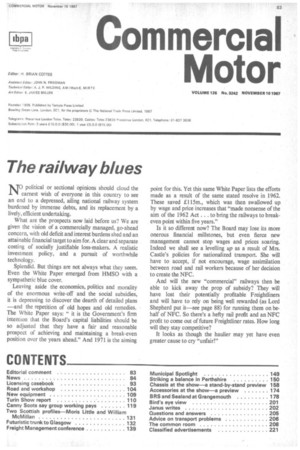The railway blues
Page 85

If you've noticed an error in this article please click here to report it so we can fix it.
No, political or sectional opinions should cloud the earnest wish of everyone in this country to see an end to a depressed, ailing national railway system burdened by immense debts, and its replacement by a lively, efficient undertaking.
What are the prospects now laid before us? We are given the vision of a commercially managed, go-ahead concern, with old deficit and interest burdens shed and an attainable financial target to aim for. A clear and separate costing of socially justifiable loss-makers. A realistic investment policy, and a pursuit of worthwhile technology.
Splendid. But things are not always what they seem. Even the White Paper emerged from HMSO with a sympathetic blue cover.
Leaving aside the economics, politics and morality of the enormous write-off and the social subsidies, it is depressing to discover the dearth of detailed plans —and the repetition of old hopes and old remedies. The White Paper says: " it is the Government's firm intention that the Board's capital liabilities should be so adjusted that they have a fair and reasonable prospect of achieving and maintaining a break-even position over the years ahead." And 1971 is the aiming point for this. Yet this same White Paper lists the efforts made as a result of the same stated resolve in 1962. These saved £.115m., which was then swallowed up by wage and price increases that "made nonsense of the aim of the 1962 Act . . . to bring the railways to breakeven point within five years."
Is it so different now? The Board may lose its more onerous financial millstones, but even fierce new management cannot stop wages and prices soaring. Indeed we shall see a levelling up as a result of Mrs. Castle's policies for nationalized transport. She will have to accept, if not encourage, wage assimilation between road and rail workers because of her decision to create the NFC.
And will the new "commercial" railways then be able to kick away the prop of subsidy? They will have lost their potentially profitable Freightliners and will have to rely on being well rewarded (as Lord Shepherd put it—see page 88) for running them on behalf of NFC. So there's a hefty rail profit and an NFC profit to come out of future Freightliner rates. How long will they stay competitive?
It looks as though the haulier may yet have even greater cause to cry "unfair!"




































































































































































































































































